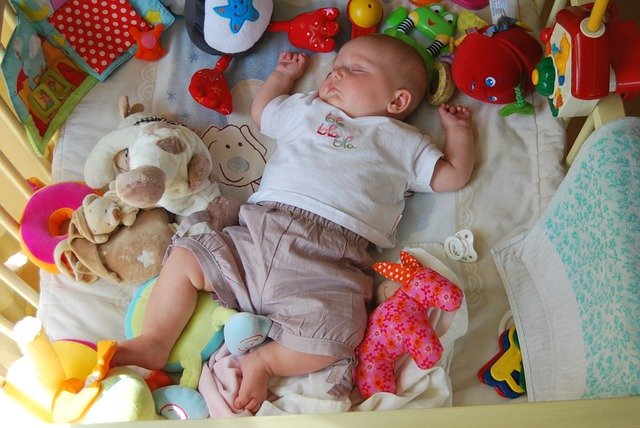Now, let’s start understanding your baby’s sleep cycles. Sleep cycles are a fundamental part of everyone’s sleep pattern; however, newborns and infants can cause a major difference in sleep quality. To help your baby sleep better, you need to understand how your child’s sleep works.
Table of Contents
Newborns
When newborn sleep was compared with older babies, children, or adult sleep, it appeared to follow some, but not all, aspects of the mature sleep cycle. A newborn has a two-phase sleep cycle: active sleep and quiet sleep.
- Active Sleep (REM Sleep): This stage of sleep is crucial for your baby’s brain development, learning, and memory consolidation. Your baby might have rapid eye movements, irregular breathing, twitching movements, and make some noise while in active sleep.
- Quiet Sleep (NREM Sleep): The respiration in this phase is prolonged and rhythmic. It also contributes to the overall physical growth and development of the body’s defense system.
In this REM sleep, your baby may make a sound and look slightly restless. Most parents wrongfully awaken their baby by assisting too much during this stage. If the child appears to be asleep but noisy, it is best not to interfere since this may awaken the baby, which means more time may be spent helping him fall back to sleep.
- Infants: By about 10-16 weeks, your baby’s sleep cycles will mature slightly. During this stage of life, the average sleep cycle is 30 to 45 minutes long, with four main stages of sleep: drowsy, light sleep, deep sleep, and REM sleep. A baby generally comes out of sleep at the end of REM and requires the sleep cycles to be connected to continue sleeping.
What Happens in Their Cases?
Some babies link their sleep cycles very quickly, while some of them need a little help in terms of rocking, comforting, or feeding. If a baby gets into these patterns, for example, being rocked or fed to sleep, he’ll expect the same later when he wakes.
Self-Soothing
This is one of the most significant issues many parents complain of: their baby’s sleep when they take short naps of about 30 minutes and then need to be rocked or fed to get them back to sleep. Teaching your baby how to fall asleep without you having to use some other soothing method is often called teaching him the skill of self-soothing. Your baby knows how to soothe himself back to sleep without your having to resort to rocking him in his bassinet or cradling him to sleep. If your baby knows how to self-settle at bedtime, this will transfer to nap times very quickly. First, we still wake up the baby after he has had a short sleep, but he will learn how to put himself back to sleep with practice and patience.
Need Help? We plan to provide good sleep foundations for babies under 12 weeks. If your baby is older and you’re battling short naps and frequent night waking’s, reach out. Request a free discovery call with one of our trained consultants today to discuss your child’s individual sleep needs.

